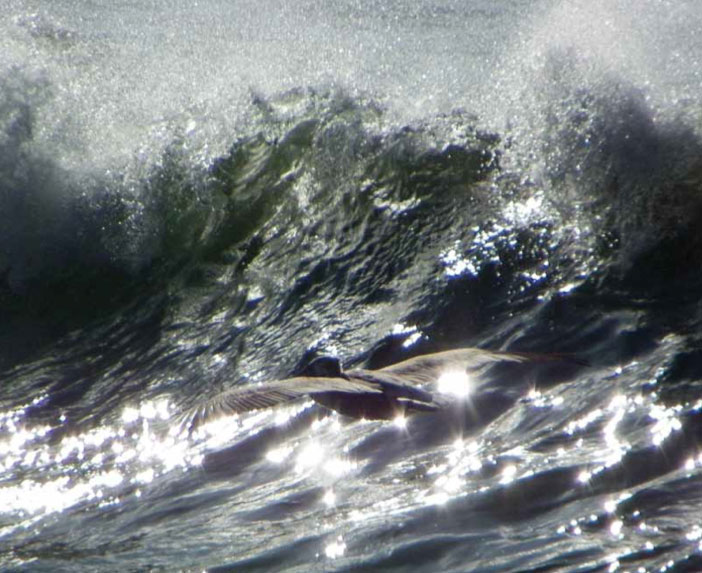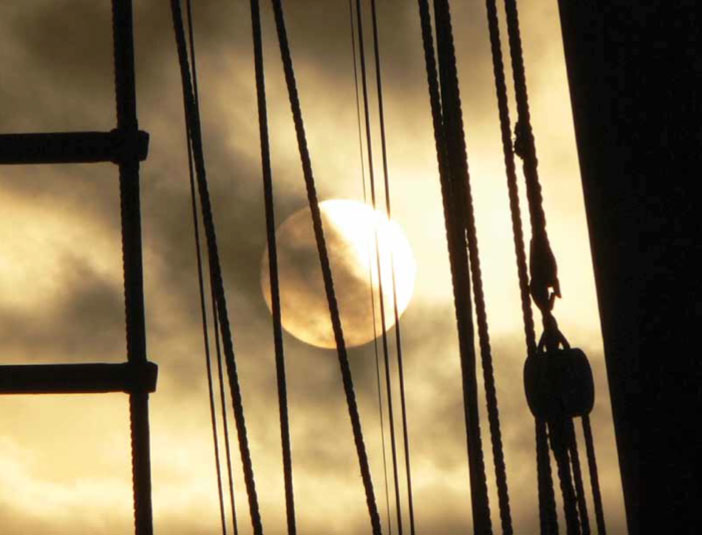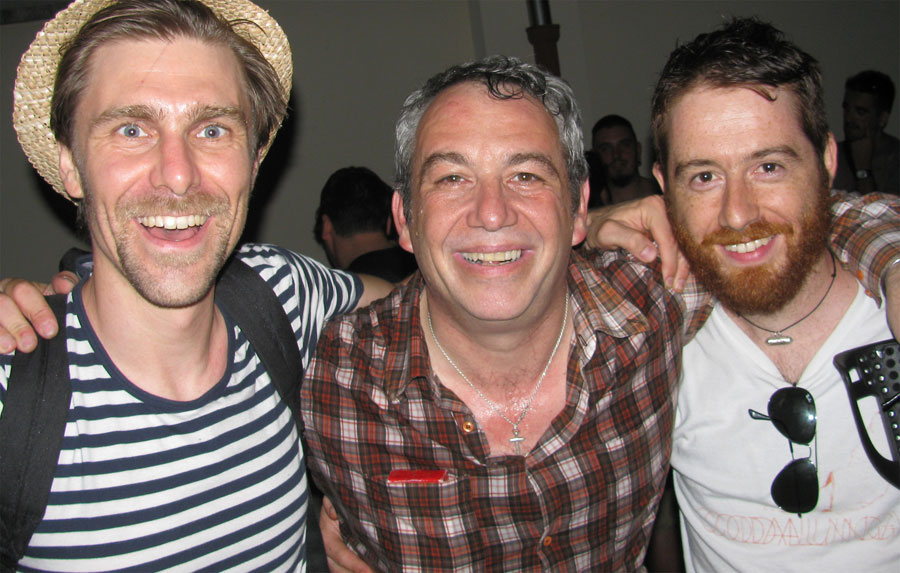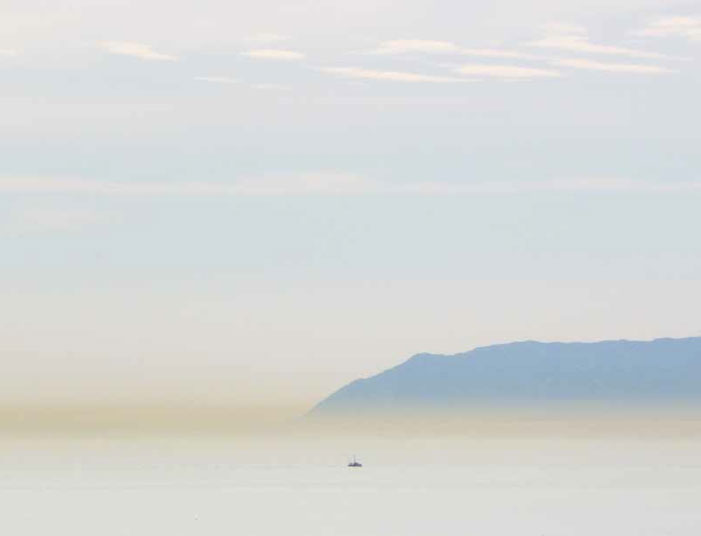One Big Reservoir
Mike Watt on books, kayaking, lighthouses, sunrises, reincarnation, oil slicks, the Stooges, Sun Ra, John Coltrane and
some semi-pointyhead stuff about creating your own damn symmetry ŠŠ in life, art and whatever else youÕre into
The idea is that sometimes, if you want to know a little bit more about a musician and the whys
and wherefores of his art ŌnÕ craft, well then it helps to listen to him talk about all kinds of other things that may or may be not even related to music at all. And:
Ōtwas ever thus about Mike Watt.
Mike Watt is a bass player, for one thing, and heÕs pretty well known as a founding member of the late,
great arty punk trio the Minutemen of San Pedro, CA, along with the late D Boon and drummer George Hurley. Watt has played with approximately
400,000 other bands since then, like Firehose, and his Material Girl tribute band the Madonnabes, Hellride, Li'l Pit, Pair of Pliers, the Jom & Terry Show,
Crimony and the original Punk Rock Karaoke with Eric Melvin of NOFX and Greg Hetson of Bad Religion. WattÕs got his Missingmen and Secondmen bands
going off and on, too, loads of worthy others, and did we mention thatÕs been thumpinÕ bass with
Iggy and the Stooges?
WattÕs got a weekly web radio program, too, called The Watt From Pedro Show (twfps.com),
and his hootpage.com blog, and many, many other things far too numerous to cram into this space right here. You need to check in at those places to get the
latest poop on everything Wattworld. (And/or check out the box at the bottom of the page for a fairly updated list of his solo and collaborative projects.)
Mike Watt is constantly on the move, even with a bum knee: LetÕs cut to the chase now with some talk about WattÕs recent photo/essay book On and Off Bass (Three Rooms Press):
BLUEFAT: I got your photo book. ItÕs beautiful.
I didnÕt know you were a photographer, truth be told. Though IÕm not surprisedÉ
MIKE WATT: YÕknow, a couple things happened at the same time. These digital cameras came out. With old cameras there was the film and the developing,
and then Instamatics. It was when I was making the first opera [Contemplating the Engine Room, 1997], my record label, Columbia, was part of Sony, so they gave me this Sony
camera that wrote pics to floppy disc, to take on tour. At the same time, I had started riding a bike, and this cat was moving to Atlanta and he sold me a 10-speed for five bucks.
I got cholera when I was 15 and I stopped riding bikes. Anyway, I was 38 years old, and IÕd never seen people around
that age riding bikes. [laughs] I was starting to get up early anyway, and I figured if get up at the crack of dawn, less people would see me. And I kind of liked
being out here riding around on my bike. ItÕs just this town, San Pedro. I came here from Virginia when I was 10, Ōcause my pop was a sailor, and San Pedro,
itÕs the harbor, also the end of the land, and the freeway. ItÕs a weird mix.
I was seeing this shit that I didnÕt even notice driving around in my car, and I was trippinÕ.
But I have bad knees ŠŠ
I had surgery in my 20s, and in fact I hurt my knee at a Stooges gig a couple of years ago. So peddling every day was hurting. So I got this idea: Get a kayak,
and give my fuckinÕ knees a break.
But the same thing happened ŠŠ IÕm seeinÕ this shit. ItÕs different than writing songs, and putting things together.
I mean, some licks will come to you by accident, but when youÕre out there by the water, you canÕt put together these scenes, like some guy with a tripod and his
lights. I mean, nature just puts it together, and if youÕve got it kind of together you can capture it.
And thatÕs what happened. And I started floatinÕ this shit on the Ōputer list to my buddies, yÕknow, not bragging or tryinÕ to say theyÕre better, but with a thought toward an album cover. Then last year this gallery in Santa Monica called Track 16 asked if these pics had been used, and they set up this show.
The way San Pedro curves on the west coast there is interesting. Where youÕre situated, youÕre actually facing east.
On the peninsula, thatÕs right. It blocks the sunset. ItÕs like San Francisco, where the people face Oakland and Alameda.
So with my pics, it was the idea of the morning, and thinking like James Joyce, yÕknow, WhatÕs
gonna be done? What can you do in the day? WhatÕs the word? Potential. But you know at sunset thereÕs about 20 minutes
of that orange-yellow light,
too. ItÕs a tricky light. A real camera man could tell you about this. But there is that special light.
That Ņeverything is seen through a dusty orange filterÓ-type feeling.

AinÕt that a trip? Mr. Whitman would call it a Ņrarified light.Ó
YouÕve got a few nice pics of the oil derricks, too.
Those are cranes that take the cans off the boats. You know, this port is the biggest in the U.S. and third biggest in the world, after
Singapore and Hong Kong. Between Long Beach and Pedro thereÕs Terminal Island, and thatÕs where the Navy Base was. They closed that down after the war,
and it turned into a can terminal, thatÕs the way things were going. And this crane thing, when I came here in Ō67 there were two of 'em, and we have over 300 now.
That terminal area is where all the animal hides used to get stored. I think the only thing we sent back in quantity
was hides, Ōcause we used a lot of cows for purses and shoes. [laughs] They stink, too. That was the days of the cows and the warehouses. But thatÕs all
gone, the cans changed all that.
How did you get these shots where the sun is so huge? You can zoom right into the sun like that?
I do. And dig, cameras have their own way of reacting to that, itÕs not like film. ItÕs kinda weird, itÕs what you call pixilation, the way things can get blocky that way; it also fucks with the colors. Not like nature.
Then youÕve got this incredible shot of the old lighthouse.
Yeah, itÕs at the AngelÕs Gate. Because Long Beach is the home of what they call the QueenÕs Gate, well, we only got a fuckinÕ beacon on a
goddamn pole. But understand that in L.A., weÕre not like San Francisco, we donÕt have a natural bay, so what they had to do was get some rocks from Catalina and
take a bend in the land ŠŠ in fact it almost was gonna be Santa Monica, because thereÕs a bend in the land there at Malibu, right? But they wanted too much money, and
Pedro said, Look, you can annex us ŠŠ this was about 1911 ŠŠ and they fuckinÕ built a railroad track on that fuckinÕ breakwater and it ended up where they put that lighthouse.
Now that lighthouse just got restored, since I took this picture.
That thing was hit by a battleship in the fog [laughs], I think it was the USS Tennessee or something, it ran into it.
Just looking at it makes you wonder what goes on inside.
Lighthouses always fascinated me. Like, the parallel is a van while on tour. YouÕre in your own world, you know? In fact, I fantasized about it. The oldest building in Pedro is the Point Fermin lighthouse, but itÕs up on a cliff, so we could be just a cab with a beacon on top. That thing had to be built all solid, because actually thereÕs five holes that were punched through the breakwater, they had to pile in boulders from the sea. Especially in Ō83 there were some big storms.
But yeah, can you imagine. They had to make those things big. TheyÕre all along PCH [Pacific Coast Highway], up to Big Sur and all that, and youÕll see some of these guys out there. And they take blows.
What about this photo of a bird? Is it a turkey?
ThereÕs a childrenÕs zoo here in Pedro for like Compton and city kids who never get to see that shit. ThereÕs a pony, thereÕs a pig, a lotta chickens. They bring in the bus and the kids get to see the animals. I think itÕs a bitchin thing. And itÕs funny Ōcause they didnÕt have turkeys over there so we called it ŅThe Bird With the Seven Legs.Ó His name is Valentina. But arenÕt they trippy? The colors! ThatÕs when theyÕre excited, you can see his feathers puff, Ōcause he has his lady nearby. I was getting a little close and he was like, Stand back there! [laughs]
The thing about the pelicans, itÕs not just the confidence in how they fly an inch above the water without flapping their wings, but they have a little song. How many birds are like that? In fact I used them at the end of the second opera, and IÕm like, I canÕt write any more, thereÕs no words. So I thought, maybe some truths are beyond words.
They got a hospital for when the birds get oil on them and caught up in six-pak holders and shit. They also get cataracts and go blind from all the diving. ThereÕs a society in Orange County that tries to help them.
The water down there is pretty filthy, though.
ItÕs a harbor, man. You wanna talk about heartbreak, when youÕre paddlinÕ and thereÕs brown foam, and when you see them sea lions and dolphinsÉitÕs a trip. The thing about a kayak is youÕre so low, even a one-foot wave is fucked [laughs]. I start off inside the harbor, do about two miles of that, past the opening to AngelÕs Gate and the breakwater. But watch out if someone flushed the toiletÉ
On the other side up by Bolsa Chica thereÕs Huntington Harbor, and theyÕve got three phony islands there, and no tides get in there ŠŠ and IÕve never paddled in a bigger toilet in my fuckinÕ life.
Tell me something about kayaking technique.
You gotta do some kind of Eskimo roll. [laughs] ItÕs not like a canoe, you just hold on to that thing, and youÕll stay up.
You wear a vest, though, right?
Every time. The law says youÕve got to. The thing about the sea: big respect, Ōcause when things go bad, they go bad quick. You heard about this yacht race last week? They say it looked like the sailboat got put in a blender.
Kayaking must be good exercise, too. Does it hurt your knees?
Maybe getting out is tough. Mine is only a nine-and-a-half footer, and the shorter your kayak, the more you have to work at it. But you donÕt have to go deep with the paddle, you just gotta keep going, and actually the motion is like a boxer kind of thing, a figure eight. It ainÕt anything like a canoe or an outrigger.

Plus thereÕs the good feeling of being down there by the water, all those negative ions stimulating your mind.
For all that heaviness about it, itÕs also just righteous, man, thereÕs a rhythm and thereÕs a power that you feel that you donÕt get anywhere on the land. It is a sensation.
So yeah, The Sea: big respect.
Big time. My pop made me learn how to sail a sailboat when I was a teenager. He had a thing about, try to
learn while thereÕs still oceans. He told me once, Never again volunteer yourself, at least not for the Navy. [laughs]
You lived in Navy housing when you were a kid, right?
The project I lived in was on Western Avenue right across from the graveyard, where Bukowski is buried.
There were three different housing projects. Actually the proj D Boon was in was Navy housing during the Second War;
afterward they decided to rent Ōem out to poor people. And I moved into the proj next to that, thatÕs how I met him. There was a park there, and he jumped out of a tree on me. [laughs]
I wanted to give an overview of all your latest musical projects, but youÕre too prolific, I couldnÕt keep up, sorry bro. One thing I wanted to hear about was this Hand to Man Band album called You Are Always On Our Minds (Post Consumer Records), which is sensational. ItÕs all over the extreme-jazz-funky-dirge-rock map.
IÕm proud of being part of that. We did that in Austin, TX. ThatÕs kind of a Nels Cline thing where you donÕt know what it is when you go into it. ThereÕs no songs, right? ThereÕs John Dieterich from Deerhoof and a piano man named Thollem McDonas whoÕs played with William Parker and Nels Cline, and drummer Tim Barnes, who was in Silver
Jews and involved with the lower East Side thing with John Zorn and all those people.
There were no songs, you say. So what was the process?
We were all in the room at the same time. I had just hurt my knee, and it was
all sweaty outside, lotsa bugs, so I just stayed in there and they all worked with me, and some
things were like, Here, IÕve got a lick, you wanna try this? And other things were just, Turn on
the tape recorder and start playing. Then John the guitar man mixed the whole thing. ItÕs like thereÕs
a lot of source material, event-driven stuff, and then they cull from it. ItÕs a very interesting way of playing, but the mixing is almost as important as the playing. ItÕs sort of like photography: I canÕt tell the sun where to be, right, so I get a second opinion after the situation has happened.
If youÕre working with people you trust, thatÕs fine.
[Guffaws] Yeah, youÕre a writer, so this happens to you all the time. I remember reading something from Mr. Faulkner how he hated editors! But now, like the book: I didnÕt pick those pictures, I didnÕt pick those diary excerpts. I was very insecure. IÕm more of a bass player, so I said, IÕll give you a bunch, you pick from them. YouÕd call that a kind of collaboration.
In the book you reference John Coltrane a lot. You talk about his idea of one
big reservoir we can all add to. That sounds so much like where your music is going, where
you are going.
Raymond Pettibon turned me onto Coltrane. You know, I grew up in Navy housing and I didnÕt know about jazz, it was Buck
Owens where I was living. When I met D Boon he only knew Creedence! He didnÕt know Cream or the Who or any of that stuff. ThatÕs why I wear flannels! I didnÕt know that was like a lumberjack thing. You know, Marc Bolan had a boa, I didnÕt know what those things were, I thought a flannel shirt was a rock & roll outfit!
Then Raymond turns me on to Coltrane. You know, those cool people in the Ō70s, they were the glam and glitter and artist
people, fuck, they blew my mind, those people. Raymond talking about Dada and Coltrane. I actually thought Coltrane was playing punk, too, I didnÕt know he was dead.
I knew he was a little older, but I didnÕt know that shit started in the late '40s. [laughs] He was already dead.
It was the emotion. In fact, the Minutemen, when we toured, we played ŅAscensionÓ before every gig. We just thought, yÕknow, punk wasnÕt a style of music for us, it was a kind of vibe. For these cats like the Screamers and Nervous Gender, punk was anything you wanted it to be. ThatÕs what those fuckinÕ beboppers were saying. Or like with bands like Dred Scott, they didnÕt fit into any genre. To me they were like my view of punk bands, that you had to make up your own mind in the moment, and you couldnÕt be referencing shit.
And then I started collecting interviews with Coltrane, and man, this cat is after Truth. And man, thatÕs what D Boon was about. It was a trip. It resonated. And with Trane, this thing about 10 to 12 hours of practice every day ŠŠ yÕknow, we came from arena rock, which is basically a Nuremburg rally, and this is a whole different side. ItÕs a very personal trip thatÕs still about sharing with other humans, and he just turned us all the way around.
I love that idea, that his music and yours and all these punk rock types and anybody else who just want to make some kind of personal sound: ItÕs all one big reservoir youÕre adding to.
You know where that came from, it was that Bukowski interview when Bukowski quotes somebody telling Coltrane, ŅSun Ra says youÕre ripping him off.Ó And Trane says, ŅYou know, I listened to his tenor man John Gilmore a lot, there might be something to that. MusicÕs a big reservoir.Ó
Yeah, Coltrane you couldnÕt get mad, it seemed. Like in that interview when they asked him what classical music is, and he says, ŅWell, I could be wrong, but maybe that's what you do when youÕre sitting down.Ó [laughs]
Say, Mike, whatÕs it all about? Where are you headed? Does it matter?
I got the Stooges, and thatÕs an interesting classroom. Yeah, Ig, he taught me a lot as a bass man. He donÕt work a machine, yÕknow? In a way heÕs kind of a bridge to the rest of us, the gig-goers. HeÕs also from the Ō60s, thatÕs trippy about him. I mean, you would not have a punk scene without that band, it ainÕt punk rock before that. So thereÕs a sensibility, they come from another world. But IggyÕs very hip, like, he knows, he digs the culture, man, he knows everything going on.
IggyÕs an interesting guy. I talked to him once, and he was really kinda refined. All he wanted to talk about was books.
Oh yeah, yeah. In fact, when I finish a book, I usually hand it over to him. And heÕs turned me on to some good books, too, like this one by this French guy where a Samadhi comes back as a dog. Ronny told me he was the valedictorian, too. Also captain of the swim team.
The thing about Iggy Pop is, heÕs not operating the machine; heÕs not caught up in minutiae, heÕs a big-picture man.
I remember when I got the call in Tallahasee, I was with the Secondmen at a place called the Townhouse, and I get the phone and itÕs Iggy, and he says, ŅMike, Ronny
says youÕre the Man.Ó I almost had a heart attack and fell over! [laughs] He says, ŅWould you do me a favor and wear a T-shirt instead of flannel?Ó [laughs] I said, Fuck yeah! It was John FogertyÕs idea anyway. He said, ŅWhat about LeviÕs and Converse?Ó I said, ThatÕs strong.
And he talked to me the longest time about the lights, and him having a nightmare where the drummer came on
in lime green and the bass player was in bright orange, and then finally he got to the music part and he said, ŅLook, however we end the song, thatÕs how we end it.Ó [laughs] And then two weeks later, I left my Secondmen guys in Memphis and I went and did that Coachella gig with the Stooges, and I was sick as a dogÉbut I didnÕt tell Iggy. No, I went and did 35 straight gigs, and them gigs burned that fever right out of me.
ItÕs a weird trip. I could never imagine that happening in my life, playing bass with Iggy Pop and the Stooges. I know D BoonÕs laughing his fuckinÕ brains out.

Super-selected semi-recent Watt discography:

1995 Ball-Hog or Tugboat? (Columbia)
1997 Contemplating the Engine Room (Columbia)
2004 The Secondman's Middle Stand (Columbia)
2010/2011 Hyphenated-man (clenchedwrench)
2010 With Floored by Four | Floored by Four (Chimera Music)
2012 Mike Watt, Richard Meltzer, Yuko Araki, Shimmy Shimizu | Spielgusher (clenchedwrench)
2012 With The Hand to Man Band | You Are Always on Our Minds (Post-Consumer)
2012 With Anywhere | Anywhere (ATP Recordings)
2012 With Mi-Gu / Choose the Light (Chimera Music)
2013 With Il Sogno di Marinaio | La Busta Gialla (clenchedwrench)
2013 New Stooges record coming out, supposedly, fingers crossed
|
|

